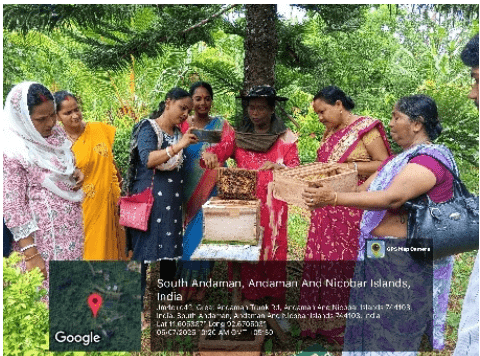Sri Vijaya Puram: To enhance rural livelihoods and promote climate-resilient farming practices, a comprehensive scientific beekeeping training program is underway across the Andaman and Nicobar Islands. The initiative, launched on June 25 and continuing through July 17, is being implemented under the National Beekeeping and Honey Mission (NBHM) scheme. It covers 30 Gram Panchayats, including tribal villages in Car Nicobar and Little Andaman.
The drive is spearheaded by the High Value Agriculture Development Agency (HVADA) and the Department of Agriculture under the A&N Administration, in collaboration with the National Bee Board, Ministry of Agriculture and Farmers Welfare. Designed to increase islanders’ participation in sustainable apiculture, the programme has so far trained 690 individuals, including farmers, Self Help Group members, and tribal youth.
Training sessions combine theoretical lessons with live demonstrations by subject matter experts. Participants are introduced to key aspects of apiculture, ranging from bee colony management and disease prevention to honey extraction techniques and value addition. To bridge language barriers and ensure grassroots access, training manuals have been published in Hindi, Bengali, and Nicobari.
In the tribal villages of Car Nicobar, where traditional ecological knowledge runs deep but exposure to structured agriculture remains limited, the response has been notably strong. Facilitators adapted the content using pictorial guides and vernacular translations to make the technical know-how accessible and contextually relevant.
The apiculture initiative arrives at a time when many island communities are seeking sustainable alternatives to seasonal labour and external dependency. Given the islands’ natural biodiversity, experts say the promotion of honeybee farming could serve both economic and ecological objectives. Increased pollination from bees not only boosts crop yields but also supports the health of native flora, which plays a critical role in food security and environmental balance in these isolated ecosystems.
The programme’s early traction is already prompting discussion around creating localised bee farming collectives, particularly among SHG members. These collectives would be equipped to share equipment, manage colonies jointly, and market honey and wax-based products within and beyond the islands.
Organisers have also hinted at future expansions, including proposals to set up micro-processing units for packaging honey and bee-based derivatives. Such steps, if implemented, could open up new income streams in areas that have long depended on fishing, subsistence agriculture, or government employment.
For now, the focus remains on completing training across the remaining 10 panchayats. As the sessions continue till July 17, the aim is to reach deeper into rural interiors and ensure that even remote habitations receive the exposure and tools necessary to take up beekeeping as a viable occupation.
Though still in its first phase, the initiative represents a shift towards decentralised, skill-based development tailored to the islands’ unique geography and social fabric. By rooting apiculture in local realities and ensuring tribal and rural inclusion from the outset, authorities are betting on a model that can be sustained by communities themselves in the long run.
In a territory where connectivity remains a challenge and employment options are often limited to a few sectors, scientific beekeeping is emerging as an unlikely but promising pathway, linking tradition, technology, and terrain in the pursuit of sustainable rural prosperity.





